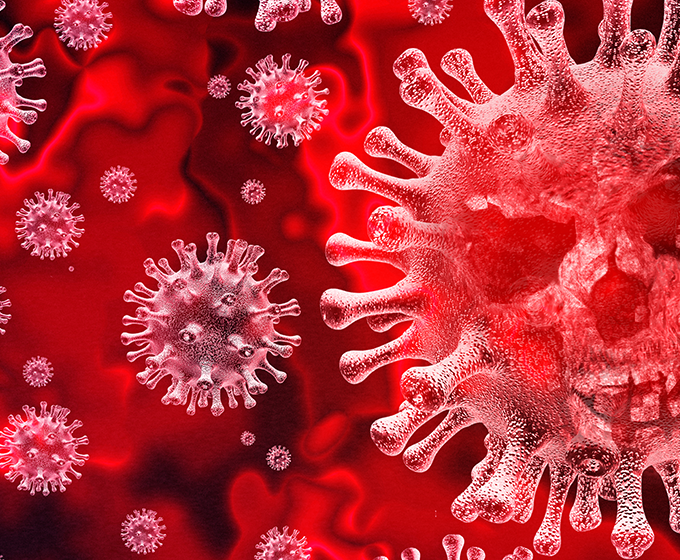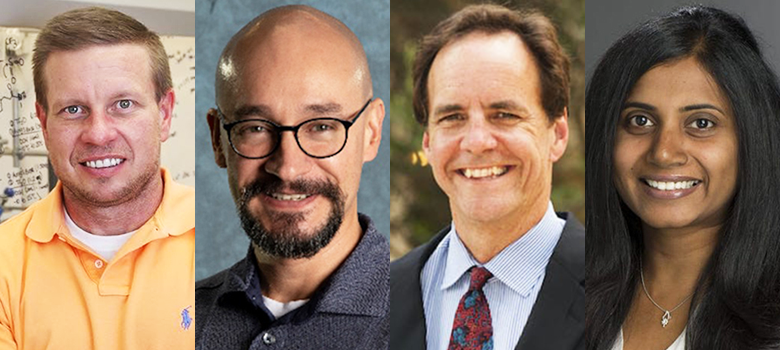
APRIL 29, 2020 — Predictive models, drug therapies, vaccine development, contact tracing and the specifics of coronavirus transmission were all approached today in the latest installment of UTSA’s Community Conversations series: Beating COVID-19: How Close Are We?
This panel discussion featured five of UTSA’s brightest researchers who have been identified as expert resources for understanding and combating COVID-19: moderator Bernard Arulanandam, vice president for research, economic development, and knowledge enterprise; Juan Gutiérrez, chair of the Department of Mathematics; Dhireesha Kudithipudi, director of UTSA’s Artificial Intelligence Consortium; Doug Frantz, cofounder of the Center for Innovative Drug Discovery; and Karl Klose, director of the South Texas Center for Emerging Infectious Diseases.
All of them briefly discussed their efforts during the pandemic before answering public questions via livestream chat.
Arulanandam set the tone for the discussion by sharing several known statistics, including the 2% national mortality rate and a testing rate of less than 1%, which he described as “highly inadequate.” He elaborated that several research ventures will be important to help improve those numbers and relieve public health systems, including predictive analytics to understand COVID-19 transmission, tracking asymptomatic cases, development of drugs and therapeutics, improving means of antibody testing, and development of an effective vaccine.
“UTSA faculty members have been actively engaged with COVID-related research,” he added before turning the conversation over to the other panelists.

UTSA panelists speak about their COVID-19 research: Doug Frantz, Juan Gutierrez, Karl Klose and Dhireesha Kudithipudi.
Gutiérrez and Kudithipudi have both been developing predictive models. Gutiérrez is modeling from an epidemiological standpoint, based on state data and factors that include numbers of hospital beds, intensive care beds and locations of nursing homes. Through the university’s Matrix AI Consortium for Human Well-Being, Kudithipudi is developing AI models to study the impact of social distancing on COVID-19’s spread based on data from the Centers for Disease Control and Prevention, World Health Organization, Texas Department of State Health Services, European CDC and local health experts.
Both stressed the importance of complying to social distancing policies to flatten the curve as well as the importance of multiple predictive models. “We have the opportunity and the duty to listen to the data—to the evidence that is being collected, apply the best methods that we know,and try to make a family of predictions,” Gutiérrez said, “because reality will be somewhere in between.”
Kudithipudi has been using AI tools to track mobility data, which gives her team a better idea of how compliant people have been to social distancing measures. The results in San Antonio have been positive thus far. “In Bexar County we have seen a significant reduction in this mobility—anywhere from a 42% to 50% mobility decrease,” she said.
While Gutiérrez and Kudithipudi have been studying the spread of the coronavirus, Frantz and Klose have been working with collaborators at UT Health San Antonio, Texas Biomedical Research Institute and Southwest Research Institute to contribute to efforts to develop treatments and vaccines.
Frantz and his team are identifying molecular compounds previously designed at the CIDD that could be used to develop a therapeutic treatment for future strains of the coronavirus—similar to how Tamiflu helps mitigate the severity of the common flu.
Meanwhile, Klose is leading a team of cross-institutional researchers aiming to engineer a vaccine with the kind of “spike proteins” found on SARS-CoV-2 that bind to cells in the human respiratory system. A successful vaccine would allow humans to develop antibodies that counteract those proteins.
“We’re on the road. That’s all I can say,” Klose said. “There’s lots and lots of scientists out there working their rear ends off right now trying to develop vaccines.”
Klose went on to discuss some of the unique qualities of COVID-19 that made it so widespread, including its persistence in air droplets and on surfaces. Even as early studies have suggested that higher temperatures and increased UV exposure will reduce both the transmission and half-life of the coronavirus, Klose pointed out that spread is largely happening indoors anyway, emphasizing the importance of social distancing in the workplace as Texas businesses gear up for “reopening.”
⇒ Watch previous Community Conversations event The Pandemic’s Economic Impact on San Antonio.
He also said that the lack of tests and a coordinated testing effort are a major problem in the United States that needs to be addressed. Not only are tests of varying quality being produced, but those administering the tests are frequently doing so inaccurately.
“If you don’t know who’s been exposed, then you can’t really start interacting in a normal way with your neighbors,” he said. “You don’t know who may have had the virus and is now immune versus someone who’s never had it and could potentially be giving it to you.”
From the irrelevance of an accurate mortality rate to the impossibility of contact tracing, the virtual conversation was not always sunny. But after discussing how the FDA is repurposing compounds and further developing drugs, Frantz ended the discussion on a promising note that all five panelists agreed on.
“Science is going to win,” Frantz said. “If you hear about the research that’s going on right now and the amount of data that’s been generated in such a short period of time for this virus, we’re going to win.”
UTSA Today is produced by University Communications and Marketing, the official news source of The University of Texas at San Antonio. Send your feedback to news@utsa.edu. Keep up-to-date on UTSA news by visiting UTSA Today. Connect with UTSA online at Facebook, Twitter, Youtube and Instagram.
Move In To COLFA is strongly recommended for new students in COLFA. It gives you the chance to learn about the Student Success Center, campus resources and meet new friends!
Academic Classroom: Lecture Hall (MH 2.01.10,) McKinney Humanities BldgWe invite you to join us for Birds Up! Downtown, an exciting welcome back event designed to connect students with the different departments at the Downtown Campus. Students will have the opportunity to learn about some of the departments on campus, gain access to different resources, and collect some giveaways!
Bill Miller PlazaJoin us for an intimate evening of cocktails, conversation, and culinary inspiration with Pati Jinich, Emmy-nominated chef and James Beard Award-winning author. Enjoy light bites and signature drinks in the warm, modern setting of Mezquite as Pati connects with guests over her passion for Mexican cuisine and storytelling.
Mezquite Restaurant in Pullman Market, 221 Newell Ave., San Antonio 78215From inspired courses to thoughtful pairings and a rich sense of community, the Ven a Comer Signature Dinner is a night of shared meals, shared stories, and unforgettable flavor.
Stable Hall (Pear Brewery), 307 Pearl Pkwy, San Antonio 78215Come and celebrate this year's homecoming at the Downtown Campus with food, games, giveaways, music, and more. We look forward to seeing your Roadrunner Spirit!
Bill Miller PlazaThe University of Texas at San Antonio is dedicated to the advancement of knowledge through research and discovery, teaching and learning, community engagement and public service. As an institution of access and excellence, UTSA embraces multicultural traditions and serves as a center for intellectual and creative resources as well as a catalyst for socioeconomic development and the commercialization of intellectual property - for Texas, the nation and the world.
To be a premier public research university, providing access to educational excellence and preparing citizen leaders for the global environment.
We encourage an environment of dialogue and discovery, where integrity, excellence, respect, collaboration and innovation are fostered.